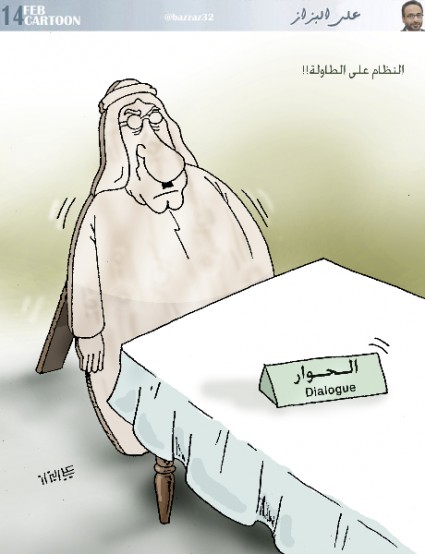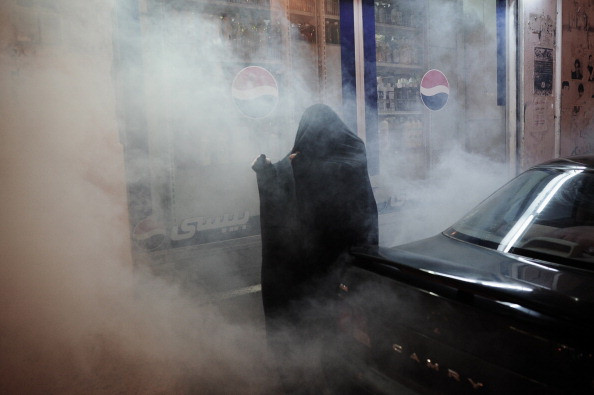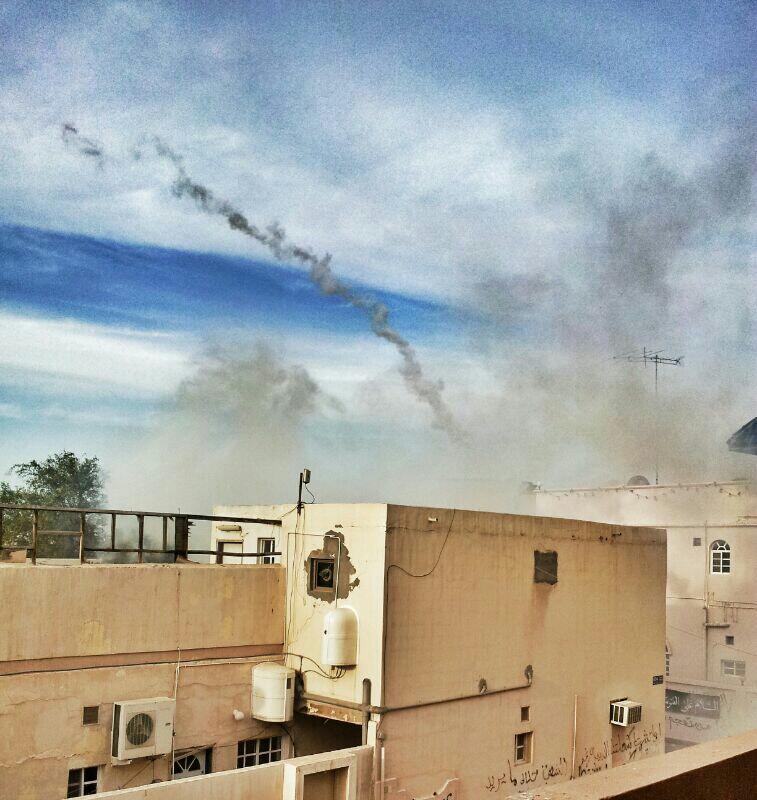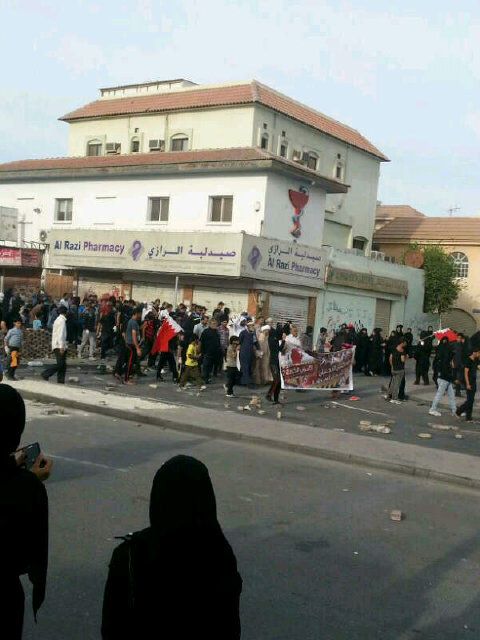The presumptious notion of salvation by Western NGOs
Bahrain or Shine
14 March, 2013 – Annika Lichtenbaum
In discussing the Middle East, media outlets and political pundits alike can’t seem to avoid lame catchphrases, which reduce the complex political developments in the region to a narrative palatable enough for the average Joe. In 2011, it was “Arab Spring” as the world hoped Arabs were actually capable of democracy, in 2012 the “Arab Winter” or “Islamist Winter” as it was proven that no, they weren’t, and the world was going to hell in an Islamist handbasket to boot. While it is early yet in 2013, it appears as though most countries that overthrew their old regimes are finding liberal democracies surprisingly hard to establish and maintain. Egypt, as I discussed last week, is most certainly at a crossroads; attempts at political reform in Tunisia are constantly being blocked; and it goes without saying that Syria, which will “celebrate” the two-year anniversary of the beginning of its revolution/civil war tomorrow, is in trouble. In fact, the doom and gloom that pervade the political news out of the region are less deserving of a seasonal than an atmospheric catchphrase: the Middle East is, at least as far as Western commentators are concerned, under a black raincloud at the moment.
But we have forgotten, as ever, about Bahrain!
After two years of unrest, it would seem that things are starting to look up for the Bahraini protestors, Shiites long oppressed by the country’s Sunni monarchy. Earlier this week, the King appointed his son, Crown Prince Salman al-Khalifa, to the post of first deputy prime minister. The Crown Prince is seen as a moderate figure in the Bahraini government apparatus (especially relative to his great-uncle, the Prime Minister) and has received praise in the past month for pushing a new round of dialogue between the regime and the opposition. And the good news doesn’t stop there: prominent political activist Sayed Yousif al-Muhafda was recently acquitted of charges of false propaganda, a surprising development considering that the regime has always jumped at the chance to throw annoying protestors into prison.
And to what (or whom) can we attribute these recent developments? One can assume, right off the bat, that they are due to some foreign influence. After all, Bahrain is not only stuck between a rock and a hard place Saudi Arabia and Iran, but it is home to the US Fifth Fleet naval base. With so many interests at stake in this tiny country’s stability, it goes without question that the outcome of its uprising will largely be determined by forces outside the archipelago itself. But other than Saudi Arabia’s military intervention on behalf of the Bahraini regime, there have been no state efforts to halt the conflict – and certainly nothing that would swing it in favor of the protestors. But if not national governments – then whom?
The answer to this question, it would seem, is Western-based NGOs. Unshackled by the national interests of their host governments, organizations like Amnesty International and Human Rights Watch have been persistent in their pursuit of human dignity for the Bahraini people. Earlier this year, Amnesty visited a major Manama prison and met with political prisoners to report on their living conditions and the circumstances of their detainment. The representatives later met with regime officials to push for the release of the protestors, whom they said were “prisoners of conscience” who had committed no punishable offense. And although those particular political figures remain in custody, several signs indicate that NGO work in Bahrain has been somewhat effective. It is promising that Amnesty was allowed to meet with government representatives and especially that it was able to conduct its prison study in the first place. Furthermore, the aforementioned acquittal of activist Sayed Yousif al-Muhafda is less surprising when considered in conjunction with this pro-activist NGO narrative. And even the Crown Prince may owe his cabinet appointment in part to human rights organizations’ advocacy for peaceful, respectful negotiation over repression.
Essentially, despite the stubborn refusal of Western governments to intervene on behalf of the Bahraini people, their NGOs have done it for them. All this suggests that NGOs are willing and able to do what their national governments are not. But are they really “able” to the same extent?
Though the presence of NGOs is having some positive effects in Bahrain, there are still deep structural problems in the country that can only be effectively addressed by the manpower, firepower and bargaining power of an actual foreign power. The national dialogue pushed for by the Crown Prince has stagnated, with government officials repeatedly denying the opposition the presence of both a royal delegate and a foreign mediator at the talks. And if that were not enough to demonstrate the regime’s staunch opposition to a mutually agreeable political solution, Amnesty’s latest Bahrain report claims, “…the lack of real political will on the part of the authorities to tackle human rights violations is enshrining a culture of impunity, and engulfing the country in entrenched unrest and fueling instability.” So what, then, is the solution – US intervention on behalf of the Bahraini people in the name of liberal values and democracy?
But despite what this may look like, I do not point out the inadequacy of non-governmental aid in order to make another call for a direct US intervention in Bahrain. To do so would be wholly unrealistic; as Obama’s upcoming first visit to Israel demonstrates, his administration persists in tiptoeing around its regional allies. Rather, I am commending the efforts of these NGOs, which (feebly successful results notwithstanding) I find preferable to full-scale US military involvement. Rain or shine, governmental or non-governmental, the West will always play a role in the Middle East (and particularly in countries as strategically important as Bahrain). But perhaps it is better in the long run for the Bahraini people to struggle with marginal gains with the help of NGOs than it is for them to achieve definitive initial success with the help of national governments. Though I may change my tune in the future if this conflict grows more violent, at this point I believe Bahrain would benefit even less from foreign intervention than it is from its current political stagnation, and that maybe NGO assistance is the only kind of foreign interference they should be getting. …source
March 15, 2013 Add Comments
Stress fractures trip the divided house of Saud as desperation marks falling Monarchs
A growing divide in Saudi Arabia between rulers, ruled
By Karen Elliott House – 14 March, 2012 – WSJ
Karen Elliott House, a former publisher of the Wall Street Journal, is most recently the author of “On Saudi Arabia: Its People, Past, Religion, Fault Lines — and Future.”
The 10-year prison sentences a Saudi court handed down last weekend are more significant than the sad fate of two moderate political activists who persisted in calling for a constitutional monarchy and respect for human rights. The saga is a microcosm of the political dilemma facing the House of Saud and, by extension, a challenge to U.S. policy, which from one administration to the next supports the regime while remaining silent about Saudi Arabia’s human rights abuses.
The two dissidents, Mohammad Fahad al-Qahtani and Abdullah al-Hamid, were accused of, among other things, sedition, providing inaccurate information to the foreign media and founding an unlicensed human rights organization, the Saudi Civil and Political Rights Association (known as ACPRA). Saudi Arabia permits no civil society or political organizations. But Qahtani, a chubby, cherub-faced man in his mid-40s, determined long ago that he would seek to change the kingdom. In 2009 he told me that he would “challenge and change the system legally,” so that his young children would live in a freer society.
Qahtani is no bomb-thrower. During our interview, he recalled arriving at Philadelphia’s Temple University (where he earned his master’s in economics in 1993) so eager to avoid pork, which is forbidden to Muslims, that he asked a waitress whether each item on an unfamiliar American menu, including Coca-Cola, contained the offensive meat. While in the United States, he managed to avoid pork but picked up a penchant for freedom.
Qahtani and Saudi authorities have been playing cat and mouse almost since his return to Riyadh in 2003 to teach economics at the Saudi Foreign Ministry. The regime long has preferred to bribe or buy wayward citizens than to beat them. When its preferred methods fail, however, the Sauds, like most Arab autocrats, can be ruthless. In 2008, Qahtani hosted a current-affairs show on government television. But after he helped found ACPRA in 2009, his show was canceled. Such harassment is intended to alter behavior or at least ensure that opposition is limited to words, never actions.
Yet Qahtani and his colleagues persisted. In 2010 they wrote an open letter to King Abdullah asking for judicial reform and calling on the nation to “engage in a peaceful struggle to resist tyranny.”
Because most Saudis depend on government jobs, or outright largess, open defiance is rare. The regime may toy with and torment citizens, like a cat with a timid mouse, but it tries to avoid arousing ire. After the Arab Spring took hold, however, even in docile Saudi Arabia some citizens have become more assertive.
Qahtani and ACPRA finally crossed a red line in January 2012 by asking the king to remove his heir, Crown Prince Nayef, who during four decades overseeing internal security was responsible for imprisoning any number of Saudi citizens without charges or trials. This request defied an explicit ban (established after the Arab Spring began) on criticizing the royal family, or its compliant religious establishment. Nayef died soon after but his son quickly replaced him, and small-scale Saudi protests multiplied. …more
March 15, 2013 Add Comments
An Unstoppable Storm of Protest creates a Climate for the fall of Bahrain’s doomed Monarchy
March 15, 2013 Add Comments
Hamad’s Road to Nowhere
March 15, 2013 Add Comments
Two Years on and Saudi Boots are no match for the Resolve of Bahrain’s Will to be Free
Clashes and teargas in Bahrain as thousands remember Gulf forces intervention
15 March, 2013 – RT
Thousands of protesters have clashed with tear gas firing police near Bahrain’s capital Manama. The anti-government riots mark the second anniversary of the Saudi-led intervention that quelled the 2011 Shia uprising in Bahrain.
The protests have brought traffic in the capital to a standstill. Thousands have taken to the streets in several villages surrounding the city. Sounds of stun grenades can be heard across the city, and most roads leading into Manama are closed, AP said.
Protesters have set up road barricades, burned tires and thrown Molotov cocktails and stones at the riot police. The police tried to disperse the rioters by firing tear gas and throwing percussion grenades into the crowds.
“No, no Saudi Occupier,” “Down with [King] Hamad,” the protesters chanted according to Press TV.
The slogans denounced the crackdown of the 2011 Bahraini uprising, which was quelled two years ago after Saudi forces and other Gulf troops were deployed in the country.
The ‘Arab Spring’-inspired uprising was led by the country’s Shia majority, with protesters demanding reforms, political freedom and equality from the country’s Western-backed Sunni rulers.
After a month of clashes that started with violent police raids on peaceful protesters, Bahrain’s Al-Khalifa royal family requested help from neighboring countries. On March 14, 2011, some 1500 troops from Saudi Arabia and the United Arab Emirates were deployed in Bahrain to “secure” the situation.
More than 80 people have been killed in Bahrain in connection with the uprising since February 14, 2011, according to human rights groups. Thousands have been arrested with reports of violence and torture used by the Bahraini police.
No progress has been made in talks between the Bahraini opposition and the government, and protests are still frequent in the country that is home to the US Fifth Fleet.
Amnesty International has criticized the US and the UK for refusing to condemn human rights violations committed by their ally, and choosing instead to “satisfy themselves with the narrative of reform while ignoring the reality of repression.”
March 15, 2013 Add Comments
The Echoing Sound of the Fallen Kingdom of Bahrain
March 15, 2013 Add Comments
Defiance Stands Her Ground Showing no Fear or Waivering
March 15, 2013 Add Comments
Children withstand the Hamad’s miserable tyranny over Bahrain
March 14, 2013 Add Comments
Revolution Unstoppable, withstands Saudi Invasion, US Silence, Int’l Apathy, al Khalifa Brutality
March 14, 2013 Add Comments
Dignity Strike II – Birdshot in Bahrain, brutal repression continues unchecked
March 14, 2013 Add Comments
Arab Women’s Activism defies Western Stereotypes of Disempowerment, Submissiveness
In sideline panel events at the 57th Commission on the Status of Women, talk was of working for further transformation in everything from the Egyptian constitution to the safety of women throughout the uprisings
Arab Women Say Time for Saying ‘Spring’ Is Over
By Hajer Naili – WeNews – 14 March, 2013
UNITED NATIONS (WOMENSENEWS)–Egyptian female activists are looking for a better constitution and members of the Syrian opposition are concerned about the violence committed by all sides of that conflict against women.
Worsening violence against women in Tunisia is also troubling.
The long and difficult process of democratization is causing many Arab women to seek new ways to describe what their region–and the women in them–are going through.
They reject the term “Arab Spring” and instead use the words “revolution” and “uprisings.”
“What we have witnessed, you cannot call it an Arab Spring,” said Zahra’ Langhi, a gender specialist and political activist from Libya. “The term was coined in the West and imposed on our reality. Whereas if you say it’s a revolution, an uprising, it means it’s a transformation.”
Last week the 57th Commission on the Status of Women began at U.N. headquarters. Violence against women is the overall theme of this year’s two-week-long event.
Karama, an Egypt-based organization working to end violence against women across the Middle East and North Africa, helped host media panels for Arab women at the conference, in conjunction with Equality Now, the New York-based group advocating for the human rights of women and girls around the world.
Along with Langhi, Mervat Tallawy, president of the Cairo-based National Council for Women, was among those invited to New York to speak.
March 14, 2013 Add Comments
Bahrain Repression Round-up
March 14, 2013 Add Comments
Hightech greed allows wholesale abuse of privacy by Human Rights absuing Regimes
Researchers Find 25 Countries Using Surveillance Software
By NICOLE PERLROTH – Huffington Post – 14 March, 2013
Last May, two security researchers volunteered to look at a few suspicious e-mails sent to some Bahraini activists. Almost one year later, the two have uncovered evidence that some 25 governments, many with questionable records on human rights, may be using off-the-shelf surveillance software to spy on their own citizens.
Morgan Marquis-Boire, a security researcher at Citizen Lab, at the University of Toronto’s Munk School of Global Affairs, and Bill Marczak, a computer science doctoral student at the University of California, Berkeley, found that the e-mails contained surveillance software that could grab images off computer screens, record Skype chats, turn on cameras and microphones and log keystrokes. The word “FinSpy” appeared in the spyware code. FinSpy is spyware sold by the Gamma Group, a British company that says it sells monitoring software to governments solely for criminal investigations.
Now, one year later, Mr. Marquis-Boire and Mr. Marczak have found evidence that FinSpy is being run off servers in 25 countries, including Ethiopia and Serbia, without oversight.
Until Mr. Marquis-Boire and Mr. Marczak stumbled upon FinSpy last May, security researchers had tried, unsuccessfully, for a year to track it down. FinSpy gained notoriety in March 2011 after protesters raided Egypt’s state security headquarters and discovered a document that appeared to be a proposal by the Gamma Group to sell FinSpy to the government of President Hosni Mubarak .
Martin J. Muench, a Gamma Group managing director, has said his company does not disclose its customers but that Gamma Group sold its technology to governments only to monitor criminals. He said that it was most frequently used “against pedophiles, terrorists, organized crime, kidnapping and human trafficking.”
But evidence suggests the software is being sold to governments where the potential for abuse is high. “If you look at the list of countries that Gamma is selling to, many do not have a robust rule of law,” Mr. Marquis-Boire said. “Rather than catching kidnappers and drug dealers, it looks more likely that it is being used for politically motivated surveillance.”
As of last year, Mr. Marquis-Boire and Mr. Marczak, with other researchers at Rapid7, CrowdStrike and others, had found command-and-control servers running the spyware in just over a dozen countries. They have since scanned the entire Internet for FinSpy. …more
March 14, 2013 Add Comments
Hamad gives Crown Prince “role” in existential bid to redeem pretense of reform in Bahrain
Bahrain crown prince given political role
11 March, 2013 – by Simeon Kerr – Zawya
Bahrain’s crown prince, Sheikh Salman bin Hamad Al Khalifa, has been appointed first deputy prime minister in a move that could bolster reform in the strife-torn island state.
King Hamad bin Issa Al Khalifa appointed his eldest son first deputy prime minister for the development of the performance of the executive authority’s bodies. He will join four other deputy prime ministers.
The reformist crown prince’s move into a frontline political role comes amid a violent crackdown on dissent led by the majority Shia community, which has been driven by hardliners within the ruling family.
Observers said the crown prince’s new position reflected a realisation that reform of government institutions will have to accompany a focus on security that has prevailed over the past couple of years.
The crown prince remains junior to his great-uncle, the 74-year-old prime minister, Sheikh Khalifa bin Salman al-Khalifa.
Premier for more than 40 years, Sheikh Khalifa personifies the status quo that pro-democracy protesters have been trying to change. But most of the large Sunni minority lauds him as a figurehead representing their interests.
The crown prince’s appointment came as dialogue limps on between the opposition, government and pro-government loyalists.
Progress in the talks, which began last month, has been slow and the parties are still negotiating the agenda.
But optimism for dialogue has been growing since Saudi Arabia, Bahrain’s strongest ally, started increasing pressure for a political solution in the island state to prevent any further spillover of unrest among the Shia of its oil-rich Eastern Province.
The killing of some protesters has caused street protests to flare, complicating the negotiations. Radical Shia youth elements reject any dialogue with the government, which they blame for repression.
Diplomats are pleased that none of the parties has quit the talks. Al-Wefaq, the main Shia opposition group, walked out of the last round of dialogue in July 2011, as it was outnumbered by loyalist groups.
The crown prince led private talks with the opposition during the height of the unrest in 2011. But the opposition failed to accept his proposals before Saudi Arabia led Gulf troops across the causeway that joins the two countries, leading to months of violent repression of pro-democracy protesters.
The crown prince has since lost the support of much of the Sunni minority, which blames him for negotiating with activists who have since been jailed on charges of trying to overthrow the government.
However, Sheikh Salman has played a behind-the-scenes role promoting reform initiatives, such as the appointment of an independent inquiry that slammed the security forces for excessive use of violence and systematic torture during the crackdown.
Sheikh Salman is expected to focus on reforming the government from within. “The crown prince now has an institutionalised role in politics,” said Doha-based political analyst Justin Gengler. …source
March 14, 2013 Add Comments
Strike of Dignity II, Paralyzes Bahrain, Security Forces Respond with Violence
“Strike of Dignity-2” Paralyzes Bahrain, Security Forces Respond Violently
Local Editor – 14 March, 2013
Strike of DignityBahrain revived on Thursday the second anniversary of the Saudi forces’ entrance to the country to assist the monarchy in oppressing the anti-regime protests that took off on the 14th of February.
Bahraini people held a general strike on this occasion, in response to the Bahraini opposition’s call for “Strike of Dignity-2”, and took to the streets in peaceful protests in over 50 cities and villages.
Protests took place in the capital, Manama, A’ali, Bani Jamrah, Al-Hajar, Al-Musalla, Setra, Bouri, Al-Akar, Maqsha, Jid Hafs, Abu Saiba, Karana, and other places.
Protestors demanded the withdrawal of the Saudi foinjured Bahrainirces which they referred to as “occupation”, and the prosecution of members who committed violation against Bahraini citizens.
In contrast, the Bahraini security forces faced demonstrations by firing toxic bombs and internationally banned shotguns at protestors, causing casualties among them.
Al-Manar correspondent in Bahrain reported that one young man in Abu Saiba was severely injured from the shotgun, while Ali Rida (18 years old) was arrested by mercenaries, while he was standing on a house roof in Al-Deir village.
Saudi statementHowever, the Bahraini Foreign Ministry said on Twitter that one “saboteur” was injured after he fell off the roof of a house in Al-Deir, and was taken to the hospital.
Other protestors were also wounded in Abu Saiba, Jidd Hafs, and Ma’ameer when they were targeted by fissile weapons, while videos broadcast on the internet showed armored vehicles running over protestors in Al-Akar.
In this context, the Saudi Foreign Ministry called on its citizens to stay away from regions of strike and public gatherings, stating on its Twitter account that “due to the strikes in the brotherly Kingdom of Bahrain, the Foreign Ministry calls on its citizens to be cautious and to stay away from regions of strike and gatherings.” …more
March 14, 2013 Add Comments
UN High Commissioner Navanethem Pillay on Human Rights in Bahrain
March 14, 2013 Add Comments
Bushra Al Hendi on Human Rights in Bahrain
March 14, 2013 Add Comments
Dr. Nada Dhaif on Human Rights in Bahrain
March 14, 2013 Add Comments
UN Member States Read Joint Statement on Bahrain to ineffectual UN High Commissioner on Human Rights
HUMAN RIGHTS IN BAHRAIN: JOINT STATEMENT BY 44 UN MEMBER STATES
11 March, 2013 – FIDH
28-Feb-2013: A joint statement on the human rights situation in Bahrain was read at the 22nd session of the Human Rights Council in Geneva during the interactive dialogue with the UN High Commissioner for Human Rights.
Presented by Switzerland on behalf of 44 UN member states, including the United Kingdom and United States of America, the statement highlights particular concern “about the continued harassment and imprisonment of persons exercising their right to freedom of opinion and expression, including human rights defenders” and calls for Bahrain to “expedite the implementation of recommendations received from the Bahrain Independent Commission of Inquiry and the recommendations Bahrain agreed to accept through the Universal Periodic Review”.
Following intense and continued advocacy by FIDH pertaining to these measures, FIDH welcomes this important move by a significant number of UN member States and continues to advocate for the immediate release of its deputy secretary general Nabeel Rajab. FIDH reiterates its condemnation of ongoing human rights violations and calls for accountability of perpetrators of violations and justice for victims. Read the full statement by the OHCHR HERE. …source
March 13, 2013 Add Comments
Saudi’s hand out extereme jail sentences to Human Rights Activists
Saudi rights activists given heavy jail terms
By Agence France-Presse – 9 March, 2013 – The Raw Story
A Saudi court on Saturday dissolved a human rights group and handed down heavy jail terms to two of its members, an AFP correspondent reported.
The judge at the criminal court in Riyadh, in delivering his verdict ordered “the dissolution of the Saudi Association of Civil and Political Rights (ACPRA), for failing to obtain authorisation, and the seizure of its assets.”
He also upheld a six-year prison term for one the group’s members, Abdullah al-Hamed, by a court of first instance, while also handing him a new five-year sentence and an 11-year travel ban to come into force when he leaves jail.
Another rights activist with the ACPRA, Mohammed Gahtani, was jailed for 10 years and banned from travelling for 10 years.
The defendants were convicted of violating a law on cybercriminality by using Twitter to denounce various aspects of political and social life in the ultra-conservative kingdom. They have 30 days to appeal.
The two men reacted calmly to the verdict, saying they planned to continue their “peaceful struggle.”
Gahtani said in June last year that he had been accused, under the law on cybercriminality, of “spreading sedition” and “rebelling against the authority” of the king.
The Saudi rights group claims to have created a file listing “hundreds of human rights violations over the past two years,” and has helped victims seeking justice.
It says the kingdom is holding around 30,000 political prisoners. …source
March 13, 2013 Add Comments
Hajji Majid Imprisoned for Crimes of Free Speech and Peaceful Demonstration in Bahrain
Bahraini Al-Wefaq association: Imprisoning “Hajji Majid” retaliation for his patriotism
8 March, 2013 – Moqawama
Bahraini opposition al-Wefaq Association described the imprisonment of Hajj Abdelmajid Abdullah, 63, also known as “Hajji Majid” on grounds of freedom of speech and peaceful demonstration an unjust and vengeful sentence for patriotic activities.
In a statement, al-Wefaq reiterated, “These cruel sentences highlight what the UN High Commissioner for Human Rights Navi Pillay mentioned of the courts in Bahrain representing political oppression and a fake image of justice.”
Hajji Majid’s arrest comes days after he starred in the artistic production “Mawtini” (My Country) that dealt with the Arab Revolutions, including the Bahraini revolution. The production showed a scene where illegal oppression and crackdowns by security forces were being enforced on Bahraini citizens.
The Hajj had played the role of a man who was beaten, arrested, and tortured more than once by security forces and abducted from his own house with his children and grandchildren, as the hymn of the well-known “Mawtini” (My Country) played in the background. …more
March 13, 2013 Add Comments
Public Relations – Bahrain Regime Acquits Yousif of Twitter Crimes and after Arresting of Six others of Twitter Crimes
Acquittal in Bahrain Twitter Case Comes as Dooley Denied Access Again
11 March, 2013 – Human Rights First
Washington, D.C. – A Bahraini court has acquitted prominent human rights defender Said Yousif Al-Muhafdah of the Bahrain Center for Human Rights (BCHR) on charges of tweeting false information.
“It’s a great relief that Said Yousif was acquitted today, bringing an end to three months of judicial harassment. Let’s hope this means the courts are beginning to show a better understanding of what freedom of expression means,” said Human Rights First’s Brian Dooley.
Al-Muhafdah was accused of tweeting about police using birdshot against protesters, He was arrested in December 2012 for “spreading false information on Twitter.” He told Human Rights First that he has was not allowed to bring defense witnesses to his trial. His case is one in a string cases stemming from the Kingdom’s ongoing judicial harassment of human rights defenders. It followed last year’s jailing of Nabeel Rajab, President of the BCHR, and of human rights activist Zainab Al Khawaja in February 2013.
“This is a small victory, but unfortunately there are many other cases of judicial harassment that continue to wind their way through Bahrain’s judicial system,” Dooley noted. “The United States has a responsibility to monitor these proceedings and to publicly comment when cases fail to meet basic legal standards.”
On March 21, the appeal of 23 medics, each sentenced to three months in prison after treating injured protestors in 2011, will continue. A verdict is expected at a date soon after. Dooley, who was in the courtroom when the medics were initially charged, was to have been in Bahrain from March 17-21, but the Bahrain Ministry for Human Rights has reversed its decision to admit him to the Kingdom. Dooley, who has authored four reports about the ongoing crackdown in Bahrain, has been forbidden access to the nation for more than a year.
“This is not how a nation that wants to trumpet its human rights record treats monitors,” said Dooley. “My reporting has been accurate. It’s clear that the Kingdom feels it has something to hide.” …source
March 13, 2013 Add Comments
Bahrain Regime Celebrates World Day Against Cyber-Censorship Arresting Six Twitter Users
Bahrain: The Authorities Celebrate the World Day against Cyber-censorship by Arresting 6 Twitter Users
12 March, 2013 – Bahrain Youth Society for Human Rights
The Bahrain Youth Society for Human Rights (BYSHR) expresses its deep concern for the Bahraini Authorities arrest of a number of Twitter users on the charge of ‘defaming the King’ Hamad bin Isa Al-Khalifa. These arrests coincide with the world celebration of countering cyber censorship.
According to the information obtained by the Bahrain Youth Society for Human Rights (BYSHR) from the families of detainees, the Authorities arrested 6 people who have accounts on the electronic website, Twitter:
1.Mr. Ali Faisal Al-Shufa (17 years old): arrested on 12 March at dawn, and the Public Prosecution ordered that he be taken to custody for 7 days, pending trial.
2.Mr. Hassan Abdali Isa (33 years old): arrested on 12 March at dawn, and the Public Prosecution ordered that he be taken to custody for 7 days, pending trial.
3.Mr. Mohsen Abdali Isa (26 years old): arrested on 12 March at dawn, and the Public Prosecution ordered that he be taken to custody for 7 days, pending trial.
4.Mr. Ammar Makki Mohammed Al-Aali (36 years old): arrested on 12 March at dawn, and the Public Prosecution ordered that he be taken to custody for 7 days, pending trial.
5.Mr. Mahmood Abdul-Majeed Abdulla Al-Jamri (34 years old): arrested on 12 March at dawn, and the Public Prosecution ordered that he be taken to custody for 7 days, pending trial.
6.Mr. Mahdi Ebrahim Al-Basri (25 years old): arrested on 11 March at dawn. His relatives confirmed to the Bahrain Youth Society for Human Rights (BYSHR) that the contents of the house were destroyed and they were verbally abused. Mahdi also faced mistreatment in the Criminal Investigations. Mahdi is a practicing lawyer.
The family of detainees confirmed that the Security Forces had confiscated “computers and mobile phones” from their houses.
The Ministry of Interior’s statement, issued after the Public Prosecution had interrogated the detainees, indicated that, “the General Directorate of Anti-Corruption and Economic and Electronic Security stated that within the framework of the Security Apparatuses work in combating violations and crimes that occur through the use of social media, a group of people were detected for abusing those methods to defame the King, and thus an inquiry was launched to identify those involved. Six people accused of committing those acts have been referred to the Public Prosecution to face legal action”. …more
March 13, 2013 Add Comments
Bahrain Protestors Demand Democracy, End of Dictatorship
Bahraini Protestors Call for Establishment of Democracy, End of Dictatorship
2 March, 2013 – FARS
TEHRAN (FNA)- A large number of Bahrainis staged a rally in the western part of capital Manama, and condemned the al-Khalifa regime for refusing to hand over the corpse of an activists killed by the security forces to his family.
The participants in the rally which was titled ‘Democracy Is Our Demand’ stressed the necessity for democratic changes and an end to the dictatorship in the country.
They also condemned the al-Khalifa regime for neglecting humane values, including its refusal to hand over the corpse of martyr Mahmoud Issa, who was killed by the security forces one week ago.
Anti-government protesters have been holding peaceful demonstrations across Bahrain since mid-February 2011, calling for an end to the Al Khalifa dynasty’s over-40-year rule.
Violence against the defenseless people escalated after a Saudi-led conglomerate of police, security and military forces from the Persian Gulf Cooperation Council (PGCC) member states were dispatched to the tiny Persian Gulf kingdom on March 13, 2011 to help Manama crack down on peaceful protestors.
So far, tens of people have been killed, hundreds have gone missing and thousands of others have been injured. …source
March 13, 2013 Add Comments
Hamad beholding to his Masters in Riyadh
Ayatollah Sheikh Mohammed Sanad “King had sold the country to the Saudi invaders and allowed foreign powers to meddle within Bahrain internal affair for the sake of power”.
“Al-Khalifa sold Bahrain to Saudi Arabia” Ayatollah Sanad
11 March, 2013 – ABNA
(Ahlul Bayt News Agency) – Bahrain prominent and well-respected Ayatollah Sheikh Mohammed Sanad warned al-Khalifa regime against betraying people of Bahrain, saying the King had sold the country to the Saudi invaders and allowed foreign powers to meddle within Bahrain internal affair for the sake of power.
He hailed the courage and bravery of the people of Bahrain, noting how very difficult their struggle had become as they were facing “This is what illuminated the hearts of the rightful, the knowledge their fight is pure and honorable, their devotion to the homeland true.”
He added “The heroic people of Bahrain are facing the evil that is al-Saud, the violators and traitors.” …more
March 13, 2013 Add Comments




































